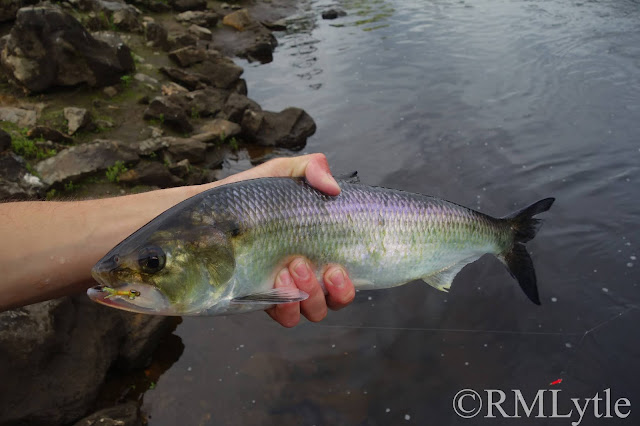Once each spring, I make a run north to get on the American shad run. The American shad draw big striped bass, just as the river herring do, but I'm not after them for that reason. Unlike the herring, the shad are big and aggressive enough to be an excellent game species. Large American shad are hard fighting, often acrobatic chrome beauties that still have traces of that saltwater pull left in them even once they're 100 miles or more inland. And that's where I chase them, because if I'm honest the shad fishery in Massachusetts- at least for a fly rodder -is leaps and bounds better than what we have in Connecticut.
Catching shad on a fly is simultaneously very simple and very complex. The flies and general fishing style are not complicated. I carry a bunch of very simple, colorful, flashy, weighted flies. Most of them use either a bead or dumbbell eyes, chenille, and flash... nothing more. The method is swinging. When it gets right down to it though, there's quite a bit of minutia involved. The fish can move a lot. They may change what color they want at the drop of a hat. Depth control and swing speed are incredibly key. Casting angle can make a huge difference. Well, it really isn't that simple is it? Some days it is, the shad go nuts and hit anything almost anywhere in the water column. But it's best to be prepared for it not to be that way.
On my one trip this year, I was showing my friend Mark Alpert the ropes. Mark is a more than adept fly angler but had never caught a shad and this was his first time looking for them in Massachusetts. I knew what we'd likely be met with and was prepared for a decent day. The fishing played out very differently for each of us.
Upon arrival, I was making constant little adjustments until I finally got a take. Depth, color, retrieve or lack thereof, position, etc. Eventually I finally started getting fish. They were in a seam right next to some pretty hard water and it was a pretty tight swing. By the time I'd called Mark and he'd gotten over to me, they were done there.
After a spell we changed location entirely. Once there, it took me a while to dial things in. I was picking up fish, but not the way I wanted to (every cast), until I got my casting angler and swing honed just right. Then I had a steady pick that lasted a little while. Mark, fishing with a single hander, was compromised. I was able to lob a very long cast even with a steep slope right at my back.
Until next time,






New water always takes some work. Just when you think you have it figured out things change. We love fishing!
ReplyDeleteNew water with new species certainly takes more work than new water with a familiar fish species, most of the time.
DeleteYet another fish to look forward to catching one day. Thanks for sharing.
ReplyDeleteThey can be a fun one!
Delete